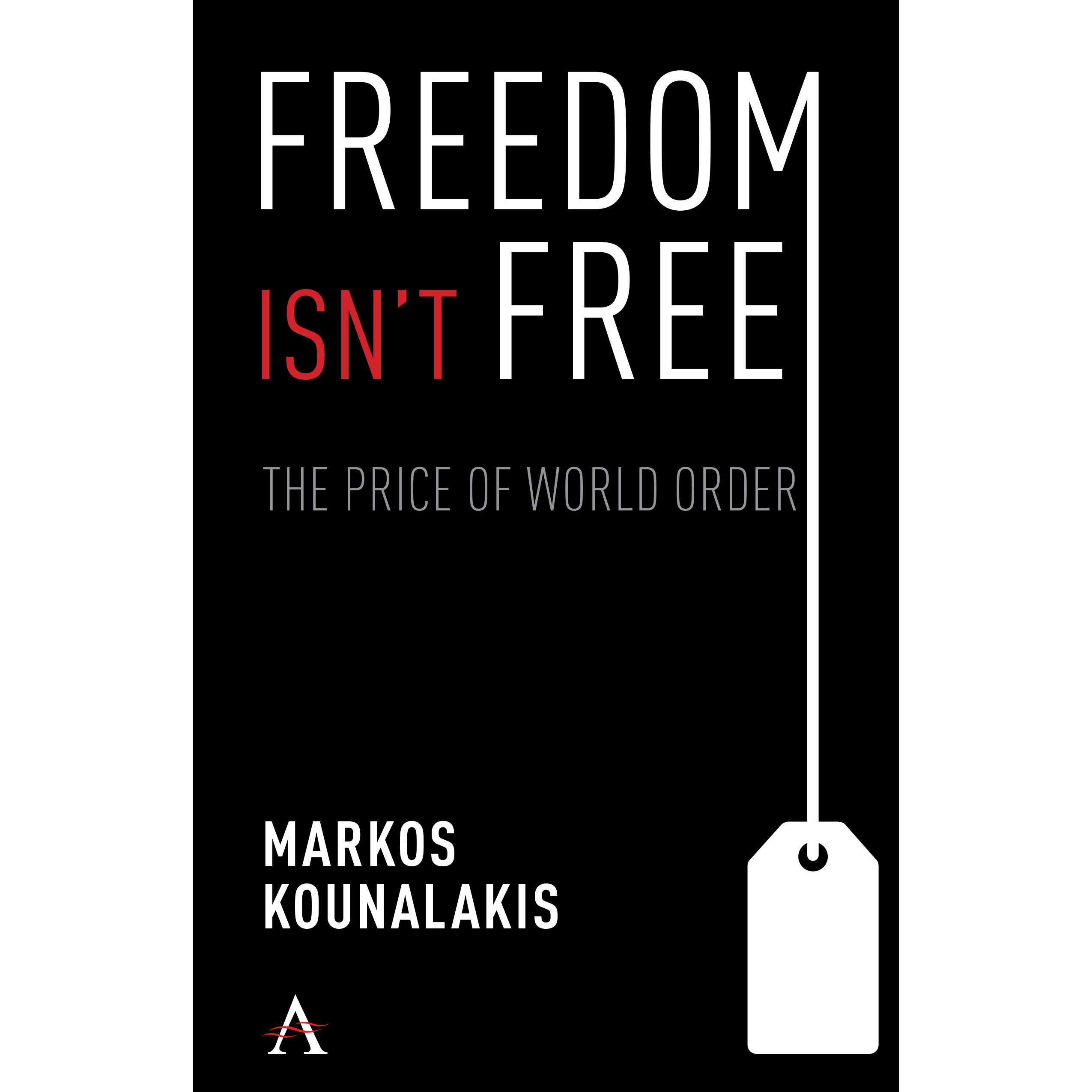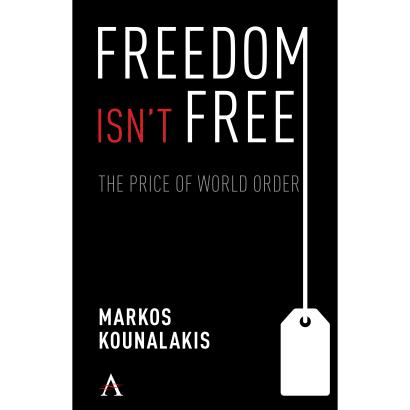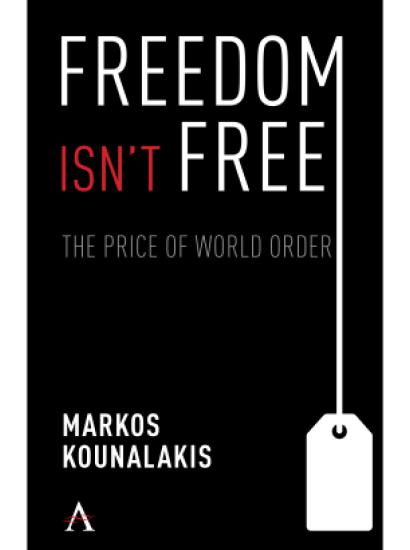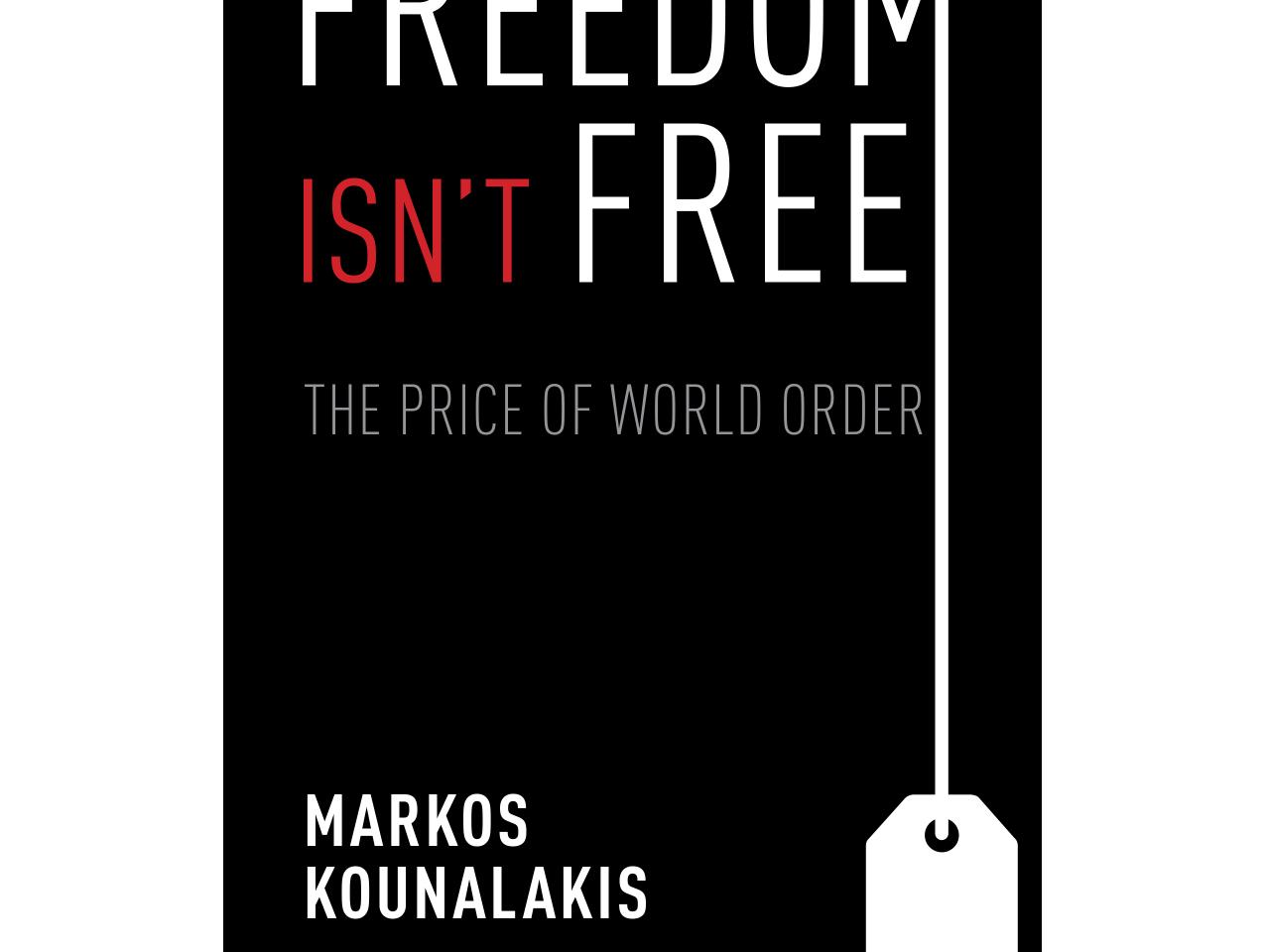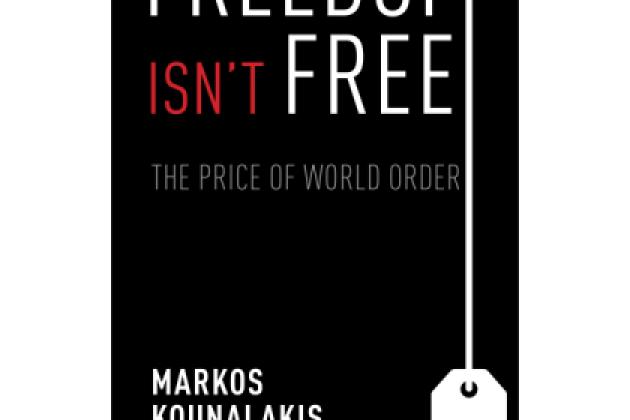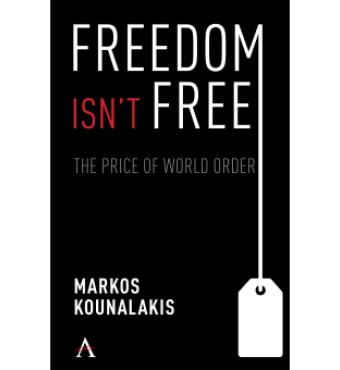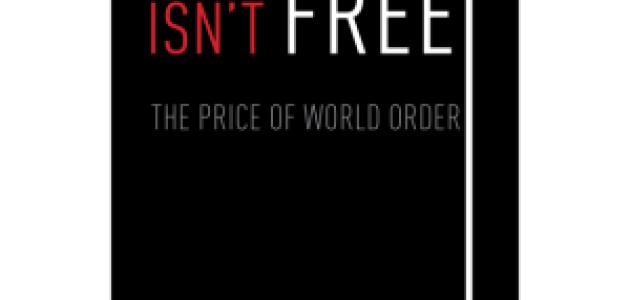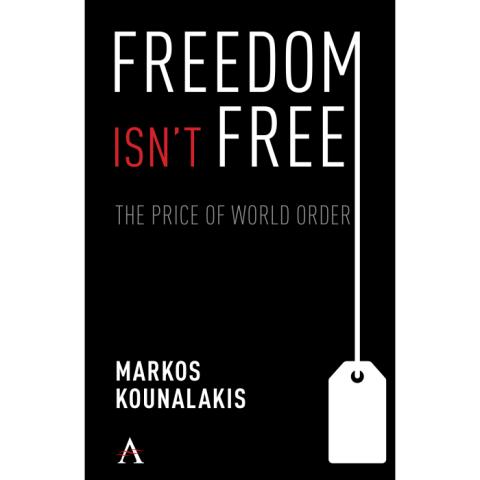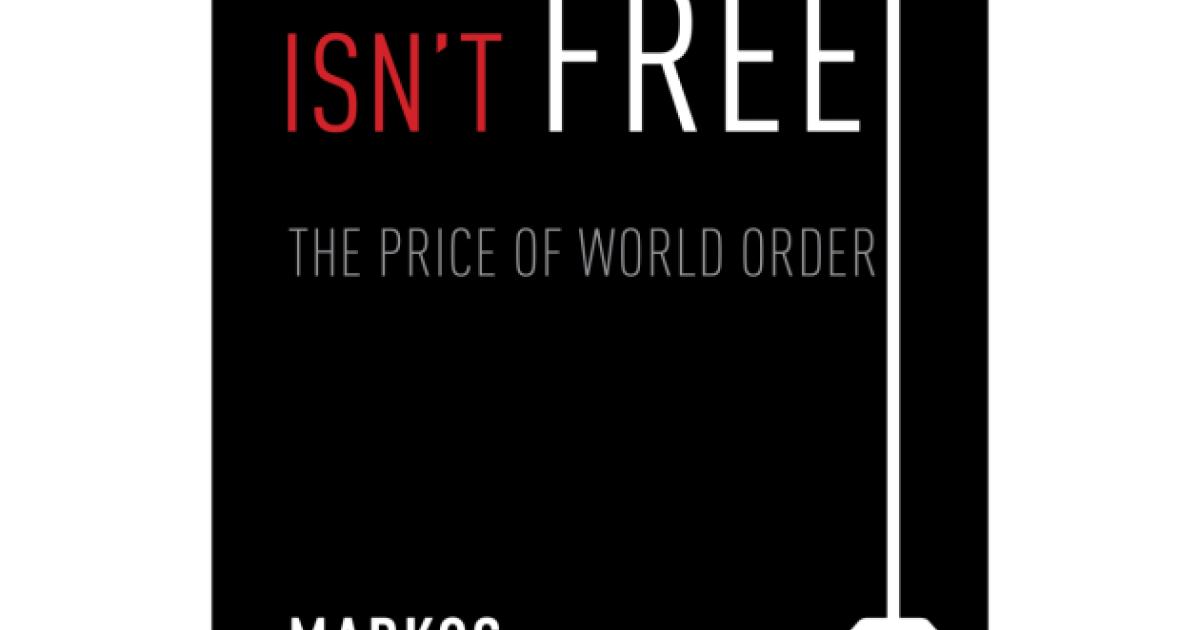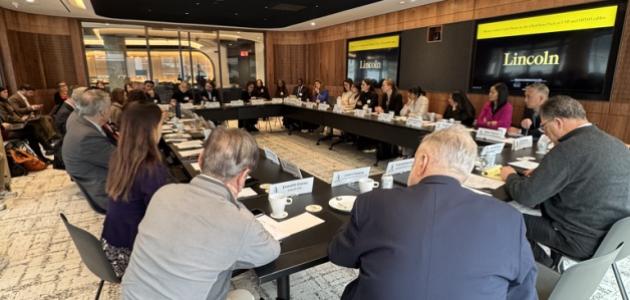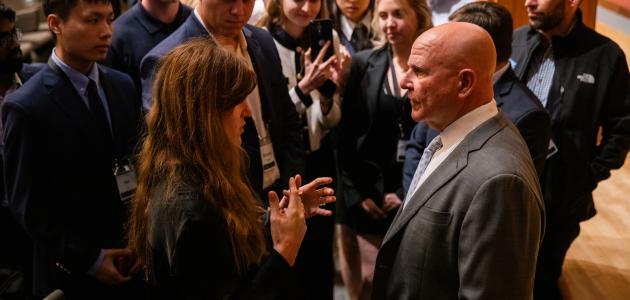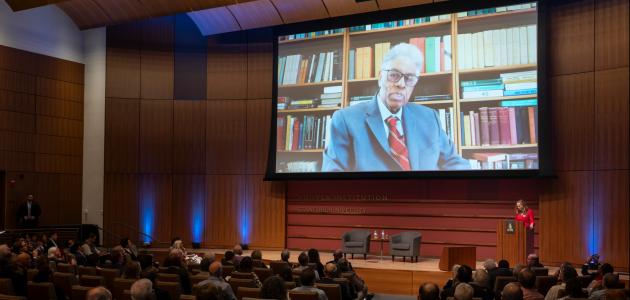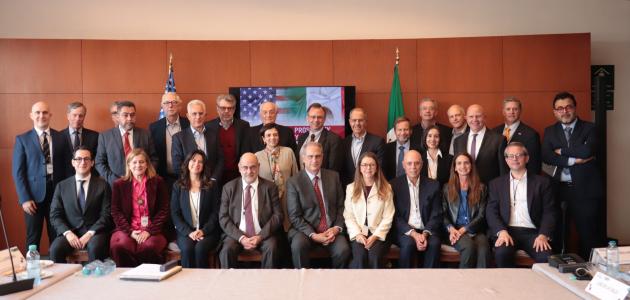By Jonathan Movroydis
Markos Kounalakis is a visiting fellow at the Hoover Institution and author of the newly released book, Freedom Isn’t Free: The Price of World Order, a volume of essays about democracy, freedom, and individual liberty selected from recent years of work as a foreign affairs columnist at the McClatchy news organization.
In this interview, Kounalakis describes several themes of the book, including the concept that freedom isn’t guaranteed to citizens but must be fought for if it is to be achieved or preserved. He argues that societies that have most successfully secured freedom are those like the United States, which have made trade-offs such as the recognition of majority-rule while protecting and advancing the rights of minorities.
Kounalakis believes that the greatest challenges to freedom today are (1) from authoritarian states like China and Russia, on which the democratic world has become increasingly dependent for manufactured goods and natural resources, respectively; (2) divisions within democratic societies that cripple their ability to roll back authoritarian trends; and (3) existential threats that enable governments to amass enormous powers and restrict the civil liberties of their citizens.
He also explains that large social media companies like Facebook present unprecedented challenges to contemporary democratic life. Such companies dominate the public information sphere and operate across multiple jurisdictions worldwide. The danger is that decision-making authority regarding what kind of information should or should not be censored has been consolidated by a small handful of people who hold majority corporate ownership stakes.
Finally, Kounalakis says that a key challenge for the United States and like-minded nations is securing their identity as free and open societies. Authoritarian states such as China exploit access to Western economies and academia while placing strict regulations on the activity of foreigners within their own borders. He concludes that Americans should reinforce the strengths that a free and open system provides their society and be vigilant about the fact that whoever dominates the technological competition over the current century will impose the rules of the road for the international community.
Will you describe the inspiration behind Freedom Isn’t Free: The Price of World Order?
Markos Kounalakis: It came as a result of my many years as a foreign affairs columnist at the McClatchy newspaper chain. I had started my career at the Sacramento Bee, moved to McClatchy in Washington, DC, and then ended up at the Miami Herald. These foreign affairs columns that I wrote on a weekly basis seemed disparate at the time, as if they had no connecting thread other than the news hook of the day. When I finally had a chance to look back on these columns, I started to notice (with the help of my publisher) that there are some running themes and, without question, those were democracy, freedom, and individual liberty. My publisher and I decided that we could put a select number of essays into a cohesive volume that emphasizes the value of democracy and how it’s come under attack globally in recent years by autocratic political regimes.
How far back in time does your selection of essays cover?
Markos Kounalakis: Columnists must remain relevant and use popular culture references as well as several other hooks to draw readers’ attention. All my references are contemporary, but I don't fail to use historic references within the body of work because I have felt the need to contextualize current events. Whether it’s the Russia-Ukraine crisis or political instability in Venezuela, such incidents are not one-offs. They follow a historical pattern. We can find leaders or nations in history that exhibited behaviors that are familiar to us today. Anyone who reads an international relations theory course would be familiar with Thucydides’ Peloponnesian War. The way Thucydides provides analysis of that war, for example, is still very relevant in today’s conflicts. As the saying goes, history doesn’t repeat itself, but it often rhymes.
Regarding the theme of freedom, do you work from a central definition, such as “the absence of necessity, coercion, or constraint in choice or action”?
Markos Kounalakis: That is what ultimate freedom is, but in the real world, freedom requires trade-offs. It requires sacrifice. It requires participation. Otherwise, if it's not worth fighting for or earning—it may not be a value that is passed on generationally. One way of looking at freedom is the absence of constraint or coercion on an individual. But it's also a question of whether states can impose their will on other nations and states.
Freedom Isn’t Free really takes a very broad-stroke look at these issues. The essays are sorted into chapters that are focused on various types of freedoms, including concepts such as freedom to worship, freedom of thought, and freedom through security.
You write in the introduction that the cost of freedom is born by “individuals, institutions and society. People sacrifice blood and treasure to achieve independence as well as to maintain and defend it.” Conceptually, does achieving or preserving freedom always require fighting for it?
Markos Kounalakis: In a perfect world, all people should be endowed with freedom. We recognize internationally that there are human rights. Many nations have signed onto the Universal Declaration of Human Rights. However, it's not surprising to anyone who picks up a newspaper that these freedoms are encroached upon daily, whether they be by other individuals, by governments, or by adversaries at a nation-state level. It really is important to understand that while freedom should be an inherent right, that’s not how it really works. You really must get out there and fight for your freedoms and defend them, because otherwise they get frittered away or taken.
You make the point in the book that some individuals and societies perceive freedom differently, and that there are many cases where some freedoms must be sacrificed for others. In the past two years, for example, many governments have restricted the freedom of its citizens to stop the spread of COVID-19. Conversely, you note in a May 5, 2020, essay that some authoritarians have exploited fear of the disease to restrict protests and other forms of public gathering. From a public policy perspective, how should we balance these trade-offs, especially when one person’s concept of freedom may be at odds with another?
Markos Kounalakis: That is a great question. It comes down to the basis of what trade-offs are we willing to make. In liberal democracies, we have a unique feature: rule of the majority and protection of minority rights. This is key. I've lived in European countries where they have elections, where they have rights for the majority of people, but exclude minorities, whether they be the Jewish population or the Gypsy Roma.
What ultimately defines an enlightened nation is the protection of minority rights. For example, it has to be made clear that while the majority of people enjoy the freedom to practice a particular religion, that doesn’t mean they can undermine someone else’s freedom of belief. For all its flaws, I don’t think there is anywhere else in the world that has more effectively managed this trade-off between majority rule and minority rights than the United States.
In keeping with the theme of your book, what do you think are the biggest current challenges to freedom in the world?
Markos Kounalakis: I would say one challenge is the rise of authoritarian nations and the way that we underwrite them economically. What I mean is our economic relationships with Russia and China.
The regime of Vladimir Putin is financed by the sale of oil and gas to Western countries. Meanwhile, the United States and other advanced economies rely on China for inexpensive manufactured goods, which has resulted in an enormous trade imbalance that has accumulated over the last few decades.
Another great challenge is what Jim Mattis refers to regularly, which is the level of division in America. If we are to fight for freedoms globally, we need to be unified in our belief in that American coda and have a general understanding of what the factual basis for it is. He has spoken out against forces and a president who “tries to divide us.” He continues to recognize the importance of duty and democracy while warning democratic societies of “tribalism.”
I believe that the division we see today in many ways is a symptom that is caused by our freedom. Within freedom and democracy exists the seeds of its own self-immolation. This was recognized by the ancient Athenians in their bold direct democracy experiment. Open societies, by definition, are vulnerable societies. Democratic rule is vulnerable to multiple popular threats and actions. How does one sometimes discern between mass popular will and mob behavior? The framers of the US Constitution understood this and inserted speed bumps and guard rails. So, we must be constantly on guard.
Finally, I would say that there are global existential challenges, whether they be climate change or nuclear armaments, in which the existential nature of these threats can enable governments to amass excessive powers to regulate civil liberties and human rights, thus proscribing them as opposed to enhancing them.
I was intrigued by an article you wrote on April 5, 2018, about how social media companies like Facebook are not organized around democratic ideas or principles, even though it is a virtual community where many people from democratic nations spend much of their time. These platforms indeed have a dark side, which includes—and is not limited to—abuses such as cyberbullying, state propaganda, and extremism. You write that “to function healthily, these platforms need representational roles for their global communities. Mayors, sheriffs, educational boards, and regulatory bodies.” In what seems like a paradox, how do you regulate free speech on those platforms with the goal of advancing freedom?
Markos Kounalakis: This is a problem that is quite difficult to regulate because we're for the first time dealing with global information companies. In the past, we've had global industries, but they were manufacturing organizations and the state could manage several of their excesses through labor legislation or other types of regulatory tools. This is a whole new global information structure where only a minority of the participants are American. I think somewhere around 5 percent to 10 percent of Facebook users, for example, are Americans. In addressing this challenge, our policy makers must work across jurisdictions, and essentially with platforms, namely Facebook, that dominate the flow of information and whose decision-making authority often belongs to a handful of individuals who hold a majority ownership stake. These power dynamics are antithetical to the development of democracy.
It’s going to be difficult to keep up with the rate of change in technology. But I think there needs to be some solution, and ideally it should be homegrown. In fact, the piece you cite is called, “Why Facebook Needs a Mayor.” Currently, policy makers are looking at some models of accountability for Facebook. For its part, the company has allowed for an independent oversight board to review its business practices and provide recommendations on censorship and the like. We are way behind the game, but on the positive side, Facebook at least recognizes it.
Facebook has hired a bunch of people, including former United Kingdom deputy prime minister Nick Clegg to address the company’s dominance over the public information sphere and issues related to social responsibility, while recognizing that it has a fiduciary duty to its shareholders. These two things may conflict with one another, but you point out one of the greatest challenges of contemporary democratic life.
In a June 19, 2020, essay you talk about how China presents enormous challenges to our economy and society, especially its most vulnerable parts, including the research enterprise and academia. You write that the then Trump administration is “trying to confront these actions by wholesale blocking some of China’s students from sensitive American research labs.” Even the Biden administration today has taken a firm stance against some US-China people-to-people connections. Although much of the world depends on America’s global democratic leadership, how can we maintain being a free and open society if our democratic values have become some of our key vulnerabilities?
Markos Kounalakis: This is the key challenge, right? How does an open society, a democratic society like ours, defend itself against near peer or peer states that don't play by the same rules, that in fact try to exploit our virtues and turn them into vulnerabilities? These include the ability to manipulate populist sentiments or the information ecology, whether they be newspapers, TV, radio, or social media, to advance agendas that are detrimental to democracy. You started out the question by asking about foreign scholars. I was appointed by President Obama as an executive committee member of the Fulbright foreign scholarship board. It's impossible to sit on that board and not recognize the value of international scholars in our society. These scholars have not just earned an advanced degree and an understanding of their respective fields in their study at American colleges and universities, but also by living here they have developed an in-depth knowledge of the United States and many of them choose to stay.
I wish more of them would decide to stay because I think that—and this is something that Tim Kane, our colleague, has written about—immigration is a net positive for our country. Having said that, we must recognize that there are vulnerabilities that come with these types of programs. For example, a very small portion of people who claim that they are foreign scholars have worked covertly with the Ministry of State Security in China. It's become especially complicated in countries like Australia, where policy makers, journalists, and concerned citizens have discovered how deep those tentacles have reached.
America is such a diverse society that I think we're able to dilute most nefarious foreign activity. Nevertheless, we must remain vigilant when it comes to our national security, whether it be on artificial intelligence or quantum computing or bioengineering or some of these other cutting-edge technologies that will define which economies are able to lead in the latter part of the twenty-first century.
This is a very real competition that the United States and other Western democracies are having with China in terms of economic and technological development. Whoever wins that battle over time will be able to impose rules of the road to the international community. It will be a model for how people perhaps see the future of their respective societies. Ultimately, the question is: Can a capitalist society that is diverse, that has this extraordinary history of well over two hundred years of democratic governance, that is ever-evolving and has its inherent vulnerabilities, compete with a nation such as China, which in part practices capitalism, but also has a social and governmental system which is not supportive of individual freedoms, and ultimately demands and extracts fealty to the Communist Party? That will be the ultimate challenge for free peoples around the world in the foreseeable future.







